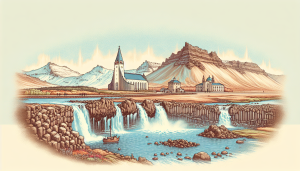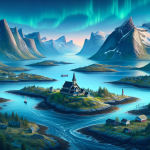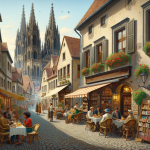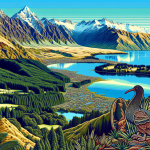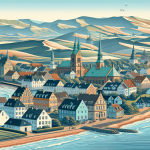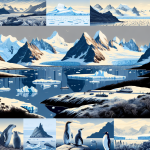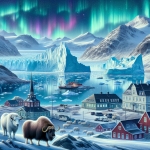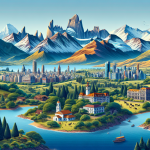The Ultimate Guide to Exploring Iceland: A Land of Fire and Ice
Iceland, often referred to as the “Land of Fire and Ice,” is a unique destination that offers a myriad of natural wonders and cultural experiences. From its majestic glaciers and active volcanoes to its charming villages and vibrant cities, Iceland has something for every traveler. This ultimate guide aims to provide you with an in-depth look at what makes Iceland such a fascinating destination. We will explore its stunning landscapes, delve into its rich history, and offer practical tips for making the most of your visit. Whether you’re an adventure seeker, a history buff, or simply looking to relax in the natural beauty of this Nordic island, Iceland will captivate your imagination and leave you with memories to last a lifetime. Get ready to discover the best that Iceland has to offer, from the awe-inspiring Northern Lights to the soothing geothermal baths, and everything in between.
The Natural Wonders of Iceland
Glaciers and Ice Caves
Iceland is home to some of the largest glaciers in Europe, including Vatnajökull, which covers approximately 8% of the country. Exploring these glaciers offers a unique opportunity to witness the raw power of nature. Guided glacier hikes are available for those looking to experience the icy landscapes up close. Additionally, the ice caves formed within these glaciers are a sight to behold. These caves, with their mesmerizing blue hues and intricate formations, offer a surreal experience that you won’t find anywhere else.
Volcanoes and Lava Fields
Iceland’s volcanic activity is another defining feature of its landscape. The island sits on the Mid-Atlantic Ridge, where the Eurasian and North American tectonic plates meet, making it one of the most geologically active areas in the world. The country has around 130 volcanoes, with some, like Eyjafjallajökull and Hekla, gaining international fame. Exploring the lava fields and volcanic craters, such as those found in the Þingvellir National Park, offers a glimpse into the island’s fiery past.
Waterfalls
Iceland boasts numerous waterfalls, each more stunning than the last. Gullfoss, or the “Golden Falls,” is one of the most famous, with its powerful cascades plunging into a deep canyon. Skógafoss, with its 60-meter drop, is another must-see, often creating rainbows in its mist. Seljalandsfoss offers a unique experience, allowing visitors to walk behind the waterfall and view it from multiple angles. These waterfalls are not just natural wonders; they are also deeply intertwined with Icelandic folklore and mythology.
The Cultural Richness of Iceland
Reykjavik: The Heart of Iceland
Reykjavik, the capital of Iceland, is a vibrant city that combines modernity with tradition. The city is home to numerous museums, galleries, and cultural institutions. The National Museum of Iceland offers insights into the country’s history, while the Harpa Concert Hall and Conference Center is a stunning example of modern architecture. Reykjavik is also known for its lively music scene, with numerous festivals and events taking place throughout the year.
Traditional Icelandic Cuisine
Icelandic cuisine is a reflection of the island’s unique environment and history. Traditional dishes often feature locally sourced ingredients, such as lamb, seafood, and dairy products. Some must-try dishes include Hákarl (fermented shark), Skyr (a thick yogurt-like dairy product), and Pylsur (Icelandic hot dogs). For those looking for a more upscale dining experience, Reykjavik boasts several Michelin-starred restaurants that offer innovative takes on traditional Icelandic flavors.
Festivals and Events
Iceland hosts a variety of festivals and events throughout the year, celebrating everything from music and film to ancient Viking traditions. The Reykjavik Arts Festival is one of the oldest and most respected cultural events in Iceland, featuring a diverse array of performances and exhibitions. The Iceland Airwaves music festival attracts international and local artists, making it a must-visit for music lovers. For a taste of Icelandic heritage, the Viking Festival in Hafnarfjörður offers reenactments, traditional crafts, and Viking-inspired feasts.
Practical Tips for Traveling in Iceland
Best Time to Visit
The best time to visit Iceland depends on what you want to experience. The summer months (June to August) offer longer days and milder weather, making it ideal for outdoor activities like hiking and whale watching. However, if you’re looking to witness the Northern Lights, you’ll want to visit between September and April, when the nights are longer and darker.
Getting Around
While Reykjavik is well-connected by public transportation, exploring the rest of Iceland is best done by car. Renting a car allows you to travel at your own pace and visit off-the-beaten-path locations. The Ring Road (Route 1) circles the entire island, making it easy to plan a comprehensive road trip. Just be prepared for varying weather conditions, especially in the winter months.
Accommodation
Iceland offers a range of accommodation options to suit different budgets and preferences. From luxury hotels and boutique guesthouses to budget-friendly hostels and campgrounds, there’s something for everyone. Booking in advance is recommended, especially during peak travel seasons, to ensure you secure your preferred lodging.
Must-Visit Attractions in Iceland
The Golden Circle
The Golden Circle is a popular tourist route that covers some of Iceland’s most iconic attractions. The route includes Þingvellir National Park, a UNESCO World Heritage site where the Icelandic parliament was established. The Geysir Geothermal Area is another highlight, featuring the famous Strokkur geyser that erupts every few minutes. Finally, the route takes you to Gullfoss, one of Iceland’s most stunning waterfalls.
The Blue Lagoon
No trip to Iceland is complete without a visit to the Blue Lagoon. This geothermal spa is renowned for its milky-blue waters, rich in minerals like silica and sulfur. The lagoon offers a range of amenities, including in-water massages, saunas, and a luxury spa. It’s the perfect place to relax and unwind after a day of exploring.
Jökulsárlón Glacier Lagoon
The Jökulsárlón Glacier Lagoon is one of Iceland’s most photographed locations. This stunning glacial lake is filled with icebergs that have broken off from the nearby Breiðamerkurjökull glacier. Boat tours are available, offering a closer look at the icebergs and the chance to spot seals and other wildlife.
Adventure Activities in Iceland
Hiking and Trekking
Iceland offers some of the best hiking and trekking opportunities in the world. The Laugavegur Trail is one of the most popular, taking hikers through diverse landscapes, including hot springs, glaciers, and volcanic deserts. For a shorter trek, the Fimmvörðuháls Trail offers stunning views of waterfalls, glaciers, and volcanic craters.
Whale Watching
Iceland is a prime destination for whale watching, with several species of whales frequenting its waters. The best time for whale watching is during the summer months when the ocean is teeming with life. Tours are available from several coastal towns, including Reykjavik, Akureyri, and Húsavík.
Northern Lights Tours
One of the most magical experiences in Iceland is witnessing the Northern Lights, or Aurora Borealis. These natural light displays are best viewed from remote locations, away from city lights. Several tour operators offer Northern Lights excursions, providing transportation and expert guidance to increase your chances of seeing this breathtaking phenomenon.
Iceland’s Unique Geothermal Features
Hot Springs and Geothermal Pools
Iceland is dotted with natural hot springs and geothermal pools, offering a relaxing way to experience the island’s geothermal activity. The Secret Lagoon in Flúðir is one of the oldest and most popular hot springs, while the Mývatn Nature Baths in the north offer a more secluded experience. For a more rugged adventure, the Reykjadalur Valley features a hot river where you can soak amidst stunning natural scenery.
Geothermal Power
Iceland is a world leader in geothermal energy, with nearly 90% of its homes heated by geothermal power. Visiting a geothermal power plant, such as the Hellisheiði Power Station, offers insights into how Iceland harnesses this renewable energy source. Guided tours are available, providing an educational experience on the science and sustainability of geothermal power.
The Rich History and Folklore of Iceland
Viking Heritage
Iceland’s history is deeply rooted in its Viking heritage. The island was settled by Norsemen in the late 9th century, and many Icelanders can trace their ancestry back to these early settlers. The National Museum of Iceland in Reykjavik offers a comprehensive overview of Icelandic history, including its Viking past. For a more immersive experience, the Viking World Museum in Reykjanesbær features a replica Viking ship and exhibits on Norse mythology.
Sagas and Folktales
Iceland’s rich literary tradition includes the famous sagas, epic narratives that recount the lives and deeds of early Icelanders. These sagas, written in the 13th century, are considered some of the most important works of medieval literature. In addition to the sagas, Icelandic folklore is filled with tales of elves, trolls, and other mythical creatures. Many Icelanders still believe in the existence of these hidden beings, and you can learn more about them at the Elf School in Reykjavik.
Historic Sites
Iceland is home to numerous historic sites that offer a glimpse into its past. Þingvellir National Park is not only a geological marvel but also a site of great historical significance. It was here that the Althing, one of the world’s oldest parliaments, was established in 930 AD. Another notable site is the Skálholt Cathedral, one of Iceland’s most important religious centers during the Middle Ages.
Iceland’s Amazing Wildlife
Bird Watching
Iceland is a paradise for bird watchers, with numerous species nesting on the island. The Westfjords and Látrabjarg Cliffs are home to one of the largest bird colonies in the world, including puffins, guillemots, and razorbills. The Mývatn area is another excellent bird-watching location, particularly for waterfowl and other migratory birds.
Marine Life
In addition to whales, Iceland’s waters are home to an array of marine life. Seals are commonly spotted along the coast, particularly in the Jökulsárlón Glacier Lagoon and the Vatnsnes Peninsula. For those interested in diving, the Silfra Fissure in Þingvellir National Park offers a unique opportunity to dive between two tectonic plates in some of the clearest water in the world.
Arctic Foxes
The Arctic fox is the only native land mammal in Iceland. These adaptable creatures can be found in various habitats across the island, from coastal areas to the highlands. The Hornstrandir Nature Reserve in the Westfjords is one of the best places to observe Arctic foxes in their natural environment.
Sustainable Tourism in Iceland
Eco-Friendly Practices
Iceland is committed to sustainable tourism, with numerous initiatives aimed at preserving its natural beauty. Many tour operators follow eco-friendly practices, such as minimizing waste and promoting responsible wildlife viewing. The Icelandic government also promotes the Leave No Trace principles, encouraging visitors to respect the environment and leave it as they found it.
Geothermal Energy
As mentioned earlier, Iceland is a pioneer in geothermal energy, which plays a significant role in the country’s sustainability efforts. Nearly all of Iceland’s electricity and heating come from renewable sources, including geothermal and hydroelectric power. This commitment to renewable energy makes Iceland one of the greenest countries in the world.
Responsible Travel Tips
To ensure that your visit to Iceland is as sustainable as possible, consider the following tips:
- Respect Wildlife: Keep a safe distance from animals and avoid disturbing their natural habitats.
- Stay on Marked Trails: This helps protect fragile ecosystems and prevents erosion.
- Reduce Waste: Carry reusable water bottles and bags, and dispose of trash properly.
- Support Local Businesses: Choose locally-owned accommodations and restaurants to support the Icelandic economy.
Conclusion
Iceland is a destination that truly has it all. From its awe-inspiring natural landscapes and rich cultural heritage to its unique geothermal features and commitment to sustainability, Iceland offers a travel experience like no other. Whether you’re hiking on glaciers, exploring volcanic craters, or simply soaking in a hot spring, you’ll find that every moment in Iceland is filled with wonder and discovery. So pack your bags, prepare for adventure, and get ready to explore the incredible land of fire and ice. Iceland awaits!
